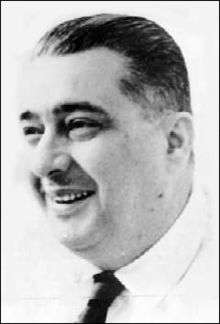José Lezama Lima
| José Lezama Lima | |
|---|---|
 From the collection of Eloisa Lezama-Lima and her book "Una Familia Habanera" | |
| Born |
December 19, 1910 Havana, Cuba |
| Died |
August 9, 1976 (aged 65) Havana, Cuba |
| Occupation | Novelist, poet |
José Lezama Lima (December 19, 1910 – August 9, 1976) was a Cuban writer and poet who is considered one of the most influential figures in Latin American literature.
Biography
Born in the Columbia Military Encampment close to Havana in the city of Marianao where his father was a colonel, Lezama lived through some of the most turbulent times of Cuba's history, fighting against the Machado dictatorship. His literary output includes the semi-autobiographical, baroque novel Paradiso (1966), the story of a young man and his struggles with his mysterious illness, the death of his father, and his developing sensuality and poetic sensibilities. Lezama Lima also edited several anthologies of Cuban poetry and the magazines Verbum and Orígenes, presiding as the patriarch of Cuban letters for most of his later years.
Although he only left Cuba twice (trips to Mexico in 1949 and 1950[1]), Lezama's poetry, essays and two novels draw images and ideas from nearly all of the world's cultures and from all historical time periods. The baroque style that he forged relied equally upon his Góngora-influenced syntax and stunning constellations of unlikely images. Lezama Lima's first published work, a long poem called "Muerte de Narciso," released when he was only twenty-seven, brought him national acclaim and established his well-wrought style and classical subject matter.
In addition to his poems and novels, Lezama wrote many essays on figures of world literature such as Stéphane Mallarmé, Valéry, Góngora and Rimbaud as well as on Latin American baroque aesthetics. Most notably the essays published as La Expresión Americana lay out his vision of the European baroque, its relation to the classical, and the American baroque.
Lezama Lima died in 1976 at age 65 and was buried in the Colon Cemetery, Havana. He was influential for Cuban and Puerto Rican writers of his generation and the next, such as Virgilio Piñera, Reinaldo Arenas, Fernando Velázquez Medina, René Marqués, and Giannina Braschi, who depict his life and works in their writing.
Works
Poetry
- Muerte de Narciso (1937)
- Enemigo rumor (1941)
- Aventuras sigilosas (1945)
- La fijeza (1949)
- Dador (1960)
Novels
- Paradiso (1966)
- Oppiano Licario (1977), unfinished and published posthumously
Essays
- La expresión americana (1957)
- La cantidad hechizada (1970)
References
Further reading
- Una Familia Habanera by Eloisa Lezama-Lima (Ediciones Universal, 1998, ISBN 0-89729-862-4)
- Solventando las diferencias: la ideología del mestizaje en Cuba. Duno Gottberg, Luis, Madrid, Iberoamericana – Frankfurt am Main, Vervuert, 2003.
- Unmothered Americas: Poetry and universality (on the works of José Lezama Lima, William Carlos Williams, Alejandra Pizarnik, and Giannina Braschi) by Rodriguez Matos, Jaime, Columbia University, 2005.